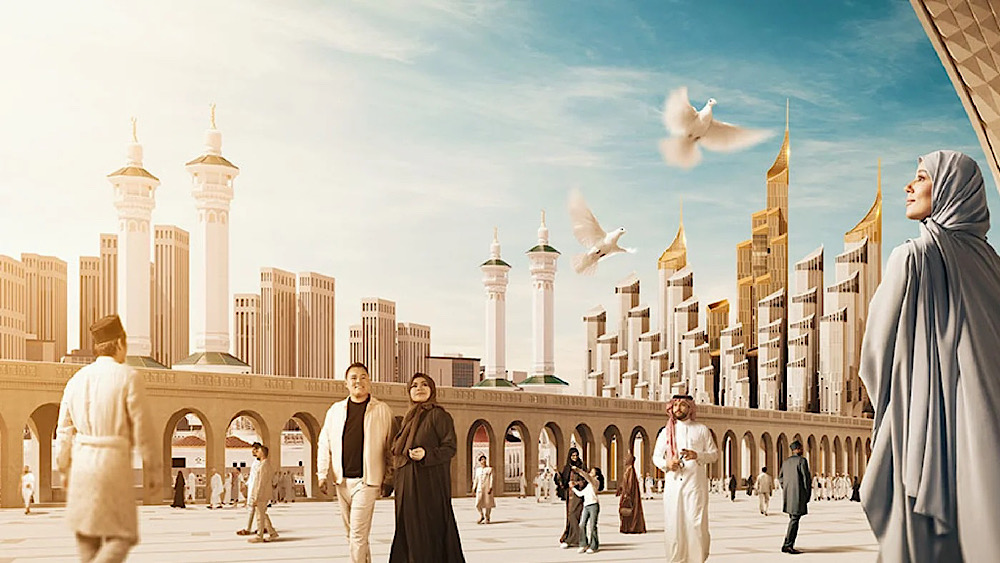Mega-project with 900,000 prayer seats and towers near the Kaaba
After scaling NEOM and other infrastructure, Saudi authorities plan to develop Islam's holy city. The King Salman Gate project was unveiled this week, covering 12 million square metres and provide 300,000 jobs over 10 years. Commercial, cultural, and residential spaces are also planned. But there are also critics.
Riyadh (AsiaNews) – The US$ 500 billion NEOM project has been shelved or scaled back. Launched in 2017, its aim was to build a mega-urban hub with industrial zones and tourist resorts, part of Saudi Crown Prince Mohammed bin Salman's Vision 2030, a plan to diversify the country’s economy and reduce its dependence on crude oil. Now the focus is on Makkah.
To this end, Saudi authorities announced yesterday a massive multiple-purpose project around the Grand Mosque in Islam's holy city, which involves the construction of tall towers near the holy site for prayer, accommodation, and hospitality.
Named King Salman Gate in honour of the reigning monarch, the new urban development area was officially launched on Wednesday and is expected to cover more than some 12 million square metres.
The project is designed to offer "residential, hospitality, commercial, and cultural experiences with capacity for around 900,000 indoor and outdoor prayer spaces," highlighting its religious purpose.
Computer-generated projections show towers of various heights overlooking the Grand Mosque, with doves of peace flying in the air.
A video released by the Public Investment Fund, Saudi Arabia's sovereign wealth fund, showcases the unique features of the development, with towering skyscrapers dominating the prayer area and pilgrims facing the Kaaba.
“In this place, hearts unite and share living moments full of delight. For within each moment, a story unfolds, bound by a common reverence and rituals to uphold,” a narrator says in the video. “Rooted in heritage, its essence prevails, tempered with whispers of peace, inviting you to exhale. A celebration of culture, old and new.”
The King Salman Gate project will be developed by RUA AlHaram AlMakki Co, also part of the Saudi sovereign wealth fund, and is expected to generate up to 300,000 jobs over the next decade, but there are no further details on the overall cost and construction timeline.
What is certain is that the plan appears to go against the grain of Riyadh's latest announcements of scaling back megaprojects launched, starting with NEOM, due to escalating costs and declining oil revenues.
It is also significant that the expansion project involves Makkah and Madinah, the two most important cities, along with Jerusalem, in Islam.
In this regard, the kingdom expects to welcome over 30 million foreign pilgrims annually to the two cities by 2030, combining religion, business and tourism.
Unlike other ambitious projects aimed at foreign tourists, such as The Line and Sindalah, Riyadh is aware that Makkah and Madinah will always attract international religious visitors.
Traditionally, the two cities are the object of two pilgrimages: Hajj (which every Muslim is required to perform at least once in their lifetime at a specific time) and Umrah, the lesser pilgrimage that can be performed at any time of the year.
Over the past few years, Saudi Arabia has relaxed visa requirements around Umrah and visiting has become more affordable for pilgrims from the global south.
The new expansion is not without controversies and concerns, particularly due to the apparent size of some of the new buildings.
The Royal Clock Tower, inaugurated in Makkah in 2012 next to the Grand Mosque, is the fourth-tallest building in the world, but has been criticised by some believers for its enormous size, which dwarfs the Kaaba.
The presence of luxury apartments and shops is also criticised because they would ultimately overshadow the religious element of the pilgrimages.
The Saudi government has also been criticised for destroying the Ajyad Fortress, an Ottoman-era citadel, to make way for the tower.
This year, the kingdom updated rules to allow foreigners to purchase property in specific areas in Riyadh and Jeddah, with "special requirements" for homeownership in Makkah and Madinah.
It is also allowing non-Saudis to invest in local, publicly traded companies that own properties in Makkah and Madinah, again with the aim of attracting international investment.
New tax rules went into effect in August and should stimulate the development of real estate projects.







.png)










